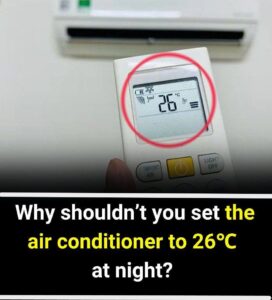Why You Should Avoid Setting Your AC to 26°C at Night

When the summer heat becomes unbearable, most people rely on their air conditioners for relief. A common choice is setting the thermostat to 26°C, which seems like a comfortable middle ground between staying cool and keeping electricity costs manageable. But according to experts, running your AC at 26°C overnight can actually be harmful to your health, waste energy, and shorten the lifespan of your unit.
Why 26°C Feels Fine During the Day—but Not at Night
During hot afternoons, keeping your AC around 26–27°C makes sense, especially when outside temperatures hover around 34°C or higher. Maintaining a gap of roughly 7–8°C from the outdoor air helps prevent sudden temperature shocks, protects your respiratory system, and keeps your AC from overworking.
At night, however, the body behaves differently. As you drift into deeper stages of sleep, your core temperature drops, your metabolism slows, and your muscles loosen. A room that felt comfortable earlier in the evening may suddenly feel too cold in the early morning hours. Sleeping in overly cool air can disturb your rest, cause muscle stiffness, and even make you more vulnerable to colds or respiratory issues.
The Ideal Nighttime AC Temperature
Most HVAC specialists recommend setting your air conditioner to around 28°C at night. This slightly warmer temperature supports your body’s natural cooling cycle, prevents midnight chills, and still keeps your bedroom comfortable. The bonus? You’ll also save on electricity, since every degree higher translates to lower energy use.
If 28°C feels too warm, many modern AC units offer a Sleep Mode feature. By starting at 26°C and then automatically increasing the temperature by 1°C per hour until it reaches 28°C, Sleep Mode ensures a gentle transition that aligns with your body’s needs and helps you stay comfortable until morning.
When 26°C Doesn’t Feel Cool Enough
Some people complain that 26°C barely cools their room. More often than not, this signals a mismatch between the AC’s capacity and the room size. If the unit is too small, lowering the temperature won’t fix the problem—it will just force the system to run constantly.
Other culprits include clogged filters, blocked vents, low refrigerant, or a faulty compressor. Regular cleaning and maintenance can greatly improve cooling efficiency, but persistent issues should be checked by a licensed technician.
The Bottom Line
While 26°C might feel fine during the day, it’s not the healthiest choice for overnight use. For better sleep quality, lower energy bills, and less strain on your AC, opt for 28°C at night or use Sleep Mode to gradually adjust the temperature. Small changes in your settings can make a big difference—for your comfort, your health, and your wallet.